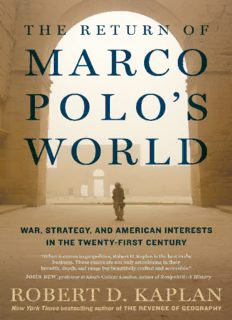
The Return of Marco Polo’s World: War, Strategy, and American Interests in the Twenty-first Century PDF
Preview The Return of Marco Polo’s World: War, Strategy, and American Interests in the Twenty-first Century
Contents Cover Title Page Copyright Epigraph Preface and Acknowledgments Strategy Chapter 1: The Return of Marco Polo’s World and the U.S. Military Response Chapter 2: The Art of Avoiding War Chapter 3: The Tragedy of U.S. Foreign Policy Chapter 4: Elegant Decline: The Navy’s Rising Importance Chapter 5: When North Korea Falls War and Its Costs Chapter 6: Rereading Vietnam Chapter 7: Iraq: The Counterfactual Game Chapter 8: The Wounded Home Front Chapter 9: No Greater Honor Thinkers Chapter 10: In Defense of Henry Kissinger Chapter 11: Samuel Huntington: Looking the World in the Eye Chapter 12: Why John Mearsheimer Is Right (About Some Things) Reflections Chapter 13: On Foreign Policy, Donald Trump Is No Realist Chapter 14: The Post-Imperial Moment Chapter 15: Fated to Lead Chapter 16: The Great Danger of a New Utopianism Marco Polo Redux Chapter 17: Traveling China’s New Silk Road Dedication By Robert D. Kaplan About the Author The origins of hot wars lie in cold wars, and the origins of cold wars are found in the anarchic ordering of the international arena….Theorists explain what historians know: War is normal. —KENNETH N. WALTZ, 1988 The lead, anchoring essay in this collection was written for the Pentagon’s Office of Net Assessment in the late summer of 2016 and was subsequently released for public view. Here and there, very sparingly, I have updated it. The other essays, going back as far as seventeen years, remain exactly as they were upon original publication. Thus, the reader will find occasional repetitions in terms of ideas and of phrases even, as well as assumptions that, from hindsight, I obviously got wrong. At the Office of Net Assessment, I thank Air Force Colonel (Ret.) James H. Baker and Dr. Andrew D. May for their help and interest. Net Assessment commissioned the essay through the Center for a New American Security (CNAS) in Washington, for which I thank CEO Michele Flournoy, President Richard Fontaine, Director of Studies Shawn Brimley, Creative Director Melody Cook, and other members of the CNAS staff. In particular, I am especially grateful for the guidance of CNAS’s director of the Defense Strategies and Assessments Program, Navy Captain (Ret.) Jerry Hendrix. Others who provided guidance and insights as I wrote this essay, for which I am grateful, include Dr. Shamila Chaudhary, Senior Advisor to the Dean, Johns Hopkins School of Advanced International Studies; Svante Cornell, Director of the Central Asia– Caucasus Institute at the Johns Hopkins School of Advanced International Studies; Reva Goujon, Vice President of Global Analysis at Stratfor; Army Colonel Valery Keaveny, Jr.; Air Force Lieutenant Colonel Robert Lyons; Marine Lieutenant Colonel Peter McAleer; Army Lieutenant General H. R. McMaster; Marine Lieutenant Colonel David Mueller; Evan Osnos, staff writer for The New Yorker; Karim Sadjadpour, Senior Associate at the Carnegie Endowment for International Peace; Navy Admiral (Ret.) James Stavridis, Dean of the Fletcher School of Law and Diplomacy at Tufts University; and Jim Thomas, Distinguished Senior Fellow at the Center for Strategic and Budgetary Assessments. Any mistake or incorrect analysis herein is entirely my own, however. Regarding the other essays, I am deeply grateful for the support over the years of all the editors at The Atlantic, The American Interest, The National Interest, and The Washington Post, especially James Bennet, James Gibney, Cullen Murphy, Scott Stossel, Adam Garfinkle, and Jacob Heilbrunn. Anna Pitoniak at Random House energetically oversaw the production and presentation of this book, with good advice throughout. My literary agents, Gail Hochman, Marianne Merola, and Henry Thayer, provided their usual, exceptional support. The late Carl D. Brandt advised me well in the early phases of this book project, as did Henry Thayer in the latter stages. Elizabeth M. Lockyer, with help from Diane and Marc Rathbun, meticulously organizes my professional life. And my wife, Maria Cabral, remains there with decades’ worth of love and support. 1. The Return of Marco Polo’s World and the U.S. Military Response AS EUROPE DISAPPEARS, EURASIA COHERES. The supercontinent is becoming one fluid, comprehensible unit of trade and conflict, as the Westphalian system of states weakens and older, imperial legacies—Russian, Chinese, Iranian, Turkish—become paramount. Every crisis from Central Europe to the ethnic-Han Chinese heartland is now interlinked. There is one singular battle space. What follows is a historical and geographical guide to it.
